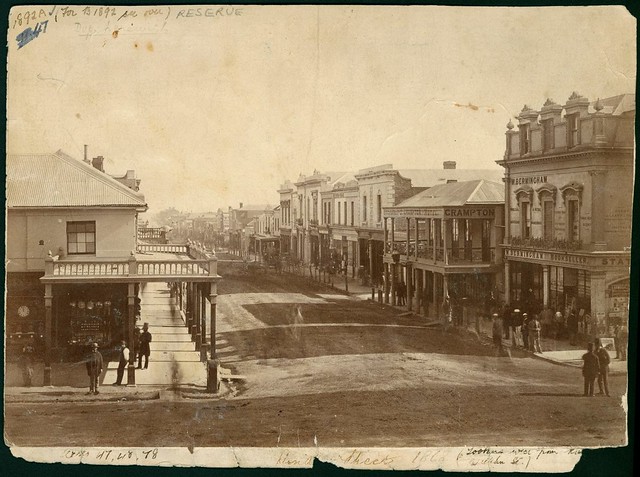Photo Library
Exchange Hotel, Hindley Street, 1868
Photo taken 30 December 1867
State Library Catalogue Reference: B 1892
On the north-east corner of Hindley Street and Gresham Street the Exchange Hotel was known as the Australian Arms Inn when established in 1839. Also known as the Auction Mart Tavern (1842-1850), Royal Exchange (1850-1851), Coppin's (1851-1854) and then interchangeably the Royal Exchange and the Exchange until its demolition in February 1960. John Crampton was the licensee from 1865 to 1867.
'Master and Servant.—John Crampton, landlord of the Exchange Hotel Hindley-street, was charged with - dismissing John Piennel, cook in his employ, without giving him due notice. Mr Downer for the complainant, and Mr. Parker for the defendant. John Piennel said the defendant engaged him on a Monday about seven or eight weeks ago. Was in his service for a week. The defendant dismissed him on the following Monday without giving him a week's notice. The wages he was to receive, exclusive of board and lodging, was £l a week. The defendant did not give him a week's wages for dismissing him without notice. By Mr. Parker—No complaints had been /made about the manner in which he did the cooking. Broke five saucers whilst he was in the defendant's service.
John Crampton, the defendant, then gave evidence. . He stated that when he engaged the complainant he said he was a first-class cook. He (witness)-gave him to understand that he-would have to get a dinner ready everyday precisely at 1 o'clock; but since he had been in his employment he had been continually late with the dinner which was a great annoyance to him (witness). On the first Friday-after he engaged the complainant, he told him he should dismiss him, and on the succeeding Monday he asked him how much he owed him. He replied that he claimed wages for a week and a day. Told his barmaid to pay him what he asked. Mr. Downer—The complainant asked for a week's, notice or a week's pay, which he refused to give him. 'The barmaid was called, and stated that she paid the complainant his wages. His Worship remarked that he did not think the conduct of the defendant, in dismissing the complainant without notice justifiable; but as the complainant appeared not to have performed his duties in the most creditable manner he should only order the defendant to pay 17s. 2ds, the complainant's wages for a week, less one day and the costs'
Adelaide Express, Thursday 14 September 1865, page 3
Visit the State Library of South Australia to view more photos of South Australia.
